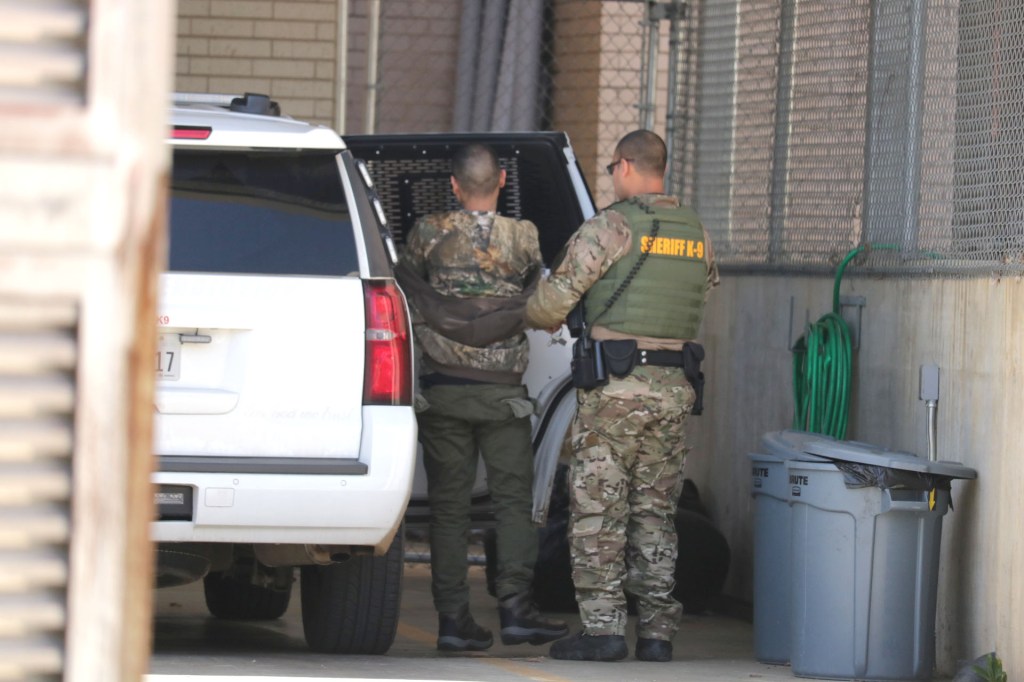Texas lawmakers want to require sheriffs to work with ICE
Published 3:46 pm Monday, March 17, 2025

- Deputies arrest a man in Smith County in March 2021. (Tyler Morning Telegraph File)
A Texas Senate panel on Monday heard a mix of staunch opposition and measured support for a bill that would require sheriffs to collaborate with U.S. Immigration and Customs Enforcement.
Sheriffs of Texas counties with more than 100,000 residents would be mandated to request and enter partnerships with ICE — known as 287(g) agreements — under Senate Bill 8, filed by state Sen. Charles Schwertner, R-Georgetown.
SB 8 — designated a top priority by Lt. Gov. Dan Patrick — would offer some funds for sheriffs of counties with fewer than 1 million residents to partner with ICE for performing limited immigration enforcement but not for the largest Texas counties. Gov. Greg Abbott has also endorsed the idea.
ICE has three models for 287(g) agreements. Two are for local jails, where officers can be deputized to question inmates about their immigration status or serve administrative warrants. In the field, officers can be permitted to question people about their immigration status through a program the Trump administration has revived after it fell into disuse following allegations it led to racial profiling.
Forty-three Texas law enforcement agencies had 287(g) agreements in place as of early March, all but three of which are for the jail programs, according to ICE.
On Monday, the calculated endorsements of SB 8 came from sheriffs concerned about the strain it could place on their budgets and resources, immigration hardliners who said the bill did not go far enough and at least one representative from a left-leaning advocacy group who said that with modifications it could be legislation the group “could” let go of their opposition.
Among those who testified before the Senate State Affairs committee was Chambers County Sheriff Brian Hawthorne, who also serves as the legislative chair of the Sheriffs’ Association of Texas.
Hawthorne said the group supported the bill, but not every member supported making ICE agreements mandatory because many sheriffs already operate under tight budgets and adding more responsibilities costs money.
“This could potentially be another budget issue,” Hawthorne testified. “We think it would be wonderful for the state Legislature to fund the program.”
Other sheriffs raised concerns about the staffing impact of sending officers to the ICE training for the program, which means traveling to the East Coast for several weeks. During an exchange about those worries, Schwertner said President Donald Trump’s immigration adviser, Tom Homan, is considering shortening the training and holding regional training sessions.
Chris Russo, the president of anti-immigration group Texans for Strong Borders, testified that the 287(g) program is essential to strengthen interior immigration enforcement but that SB 8 should require all Texas law enforcement, not just sheriffs, to enter into the agreements.
“Although we support this bill, the mandate for participation we think should be broadened,” Russo said.
Luis Figueroa of Every Texan, a public policy group that advocates for equity, told lawmakers it was “problematic” to pass costs onto counties and that SB 8 could be strengthened by limiting it to the jail programs and ensuring that any agreements require training. Still, the group was worried about the blurring of jurisdictional lines between local and federal authorities, who have long been solely responsible for immigration enforcement, he said.
“Would your organization support the bill with those changes?” Schwertner asked Figueroa.
“I think we could let it go,” Figueroa said. “If we could limit this to jails, that would be a very strong improvement to the bill and we’d love to work with you on that.”
Meanwhile, a series of speakers from organizations including the American Civil Liberties Union and the Texas Civil Rights Project blasted the bill as a waste of money and slippery slope into racial profiling.
“This is a completely unfunded mandate,” said Sarah Cruz of the ACLU of Texas, pointing to Harris County — the state’s most populous — ending its participation in the program a few years ago after determining money was better spent on bolstering public safety through other initiatives. “How much more are we willing to put towards an anti-immigrant agenda than the needs of our communities?”
— This article originally appeared in The Texas Tribune, a member-supported, nonpartisan newsroom informing and engaging Texans on state politics and policy. Learn more at texastribune.org.
Smith County will implement jail and task force models
In February, Smith County signed an agreement with ICE to enforce the 287(g) task force model. The department will begin implementation of the task force model once selected officers complete required training. Once certified, deputies will have the authority to question individuals suspected of being in the U.S. unlawfully and process them for immigration violations.
These deputies will have the ability to arrest individuals without a warrant if they are found to be unlawfully entering the country or are suspected of violating immigration laws and are likely to flee before a warrant is obtained. Upon completing training, certified deputies will also have the power to arrest individuals for immigration-related felonies without a warrant under similar circumstances.
Additionally, they will be authorized to serve and execute immigration arrest warrants, administer oaths, collect evidence — including fingerprinting, photographing and interviewing — and prepare affidavits.
While the task force model will be new to Smith County, the sheriff’s office will also soon reinstate its jail enforcement model. The office has used this model before, beginning in 2017 until Smith later put it on hold about a year and a half ago. Under this model, ICE trains local personnel to process these cases themselves, allowing them to assume some of ICE’s responsibilities.







